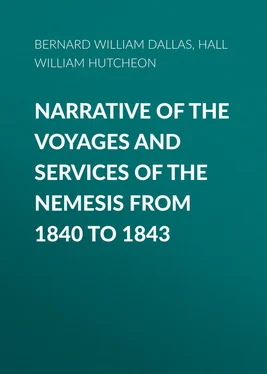William Hall - Narrative of the Voyages and Services of the Nemesis from 1840 to 1843
Здесь есть возможность читать онлайн «William Hall - Narrative of the Voyages and Services of the Nemesis from 1840 to 1843» — ознакомительный отрывок электронной книги совершенно бесплатно, а после прочтения отрывка купить полную версию. В некоторых случаях можно слушать аудио, скачать через торрент в формате fb2 и присутствует краткое содержание. Жанр: foreign_antique, foreign_prose, на английском языке. Описание произведения, (предисловие) а так же отзывы посетителей доступны на портале библиотеки ЛибКат.
- Название:Narrative of the Voyages and Services of the Nemesis from 1840 to 1843
- Автор:
- Жанр:
- Год:неизвестен
- ISBN:нет данных
- Рейтинг книги:5 / 5. Голосов: 1
-
Избранное:Добавить в избранное
- Отзывы:
-
Ваша оценка:
- 100
- 1
- 2
- 3
- 4
- 5
Narrative of the Voyages and Services of the Nemesis from 1840 to 1843: краткое содержание, описание и аннотация
Предлагаем к чтению аннотацию, описание, краткое содержание или предисловие (зависит от того, что написал сам автор книги «Narrative of the Voyages and Services of the Nemesis from 1840 to 1843»). Если вы не нашли необходимую информацию о книге — напишите в комментариях, мы постараемся отыскать её.
Narrative of the Voyages and Services of the Nemesis from 1840 to 1843 — читать онлайн ознакомительный отрывок
Ниже представлен текст книги, разбитый по страницам. Система сохранения места последней прочитанной страницы, позволяет с удобством читать онлайн бесплатно книгу «Narrative of the Voyages and Services of the Nemesis from 1840 to 1843», без необходимости каждый раз заново искать на чём Вы остановились. Поставьте закладку, и сможете в любой момент перейти на страницу, на которой закончили чтение.
Интервал:
Закладка:
Mozambique was taken from the Arabs by the Portuguese, at the very commencement of the sixteenth century; and the extent of the fort of St. Sebastian, built there by them, and which, even now, might be rendered a very strong fortification, capable of mounting nearly a hundred guns, if in proper repair, will be sufficient to show the great importance which they attributed to it, even in that early period of its settlement. It still contains large barracks and extensive quarters and storehouses, but only a very small and feeble garrison, of scarcely more than a couple of hundred men, either black or creole sepoys. There are likewise two other smaller forts upon the island, which may therefore be considered strongly fortified, although more indebted to the past than to the present, for the importance, which, at first view, it appears to possess.
The public buildings of Mozambique all bespeak the value of the settlement to its possessors, in the days of Portuguese maritime distinction. The governor's palace must have been, in its best days, a residence worthy of an influential ruler. It is built of stone, is of considerable extent, and has some fine rooms in it; in fact, it speaks much for the importance attached by the Portuguese, in former times, to their eastern possessions. The large stone wharf, built on handsome arches, with the fine Custom House, in a sort of square at the extremity of it, clearly point out the ancient commercial value of the settlement; withered at last, perhaps, more by the paralysing effects of the slave-trade, than by any natural decrease in the commercial capabilities of the east coast of Africa.
In short, the city has retrograded into comparative insignificance; the number of resident Portuguese has become very inconsiderable, with the exception of some Canareens or creole Portuguese, born in other Portuguese possessions in India, and, though commonly called white, only so "by courtesy," being often quite as black as the true Indians. Bad government and moral deterioration have added not a little to the other causes of its downfall; and it will scarcely be credited, that a distinct law has been passed, that those who were married should be compelled to remain there, or, at least, not return to their own country. The effect of so extraordinary a measure, has been, that nobody is disposed to get married at all; and, so low a tone of moral feeling has come to prevail, that the sexes live together openly, without any matrimonial or moral ties, and with little feeling of shame at the absence of them.
I have dwelt a little upon these particulars concerning Mozambique, because it is the principal of all the Portuguese settlements on that coast; and if, as such, it has fallen so far from its former state, we may judge how the others must now be lingering on between life and death. The fatal influence of the slave-trade appears to paralyse the whole commercial traffic of the country; the natives, being reduced to mutual distrust of each other, and continually living in fear and poverty, are unable to purchase the comforts of foreign manufactures. The selling of slaves is almost the only profit of the chiefs, unfitting them for every other enterprise, and deadening within them every feeling of honour and every hope of improvement. A universal stagnation seems to hang over the mind of man, as well as over the productions of the earth. Were it not for the industry of the Arab population in the neighbourhood, a periodical famine would inevitably occur. At the present moment, the whole of the Portuguese possessions, along the Rios da Senna, do not supply even enough grain for their own consumption. Yet the country is a remarkably fine one, capable of producing luxuriantly all the fruits of the earth, and, were it cleared and cultivated, would become habitable even for Europeans, through the improvement of its climate; yet, there is much land now neglected and barren, which was once highly cultivated.
The slave-trade is, in fact, a worse pestilence to the country than even the fever itself; and Mozambique, Quillimane, Delagoa Bay, Sofala, and Inhamban, are all fallen to the lowest grade of civilization. If you ask the simple tale of history, what has been the effect of Portuguese rule upon that coast, you will hear neither of savages reclaimed, soil improved, commerce extended, justice and mercy practised, nor Christianity taught. The blight of slavery has poisoned everything on which it rested.
Nevertheless, as a place of call for refreshment, for ships passing through the Channel, Mozambique has some claims to attention. Abundance of vegetables and fruit are to be obtained there; pigs and goats are readily to be purchased, as well as poultry, and, were the demand for bullocks larger, they would soon be brought to market in numbers. At present, however, they are very dear.
But the great treasure of the place remains yet to be developed; at all events, the subject is well open to investigation. The existence of good coal in that neighbourhood is now, I believe for the first time, made public. There is reason to expect that it will be found in large quantity, and of good quality, although as yet the search for it has not been carried on to any great extent. The all-engrossing subject of the slave-trade seems to darken every other object of attention in that quarter, and the Portuguese are probably afraid that the discovery of coal in their settlements would occasion the continual visits of so many steamers and other vessels, that even greater difficulty would be thrown in the way of the traffic.
Just as the Nemesis was leaving the harbour, the captain of an English merchant ship, the only one there at the time, brought off a large piece of excellent coal for inspection. It had all the appearance of coal perfectly adapted for steaming purposes; it was stated to be found at Quillimane, (the settlement before alluded to) about three hundred miles to the southward of Mozambique, and that there is every reason to believe it might be procured in large quantities, and worked without difficulty. This specimen was sent to England for examination, by Captain Hall; but it has since been ascertained that it did not reach its destination. This is on all accounts to be regretted. It was sent down to the Cape of Good Hope from Mozambique, in a box, with directions that it should be forwarded to the India House, but was probably lost, or set aside at the Cape.
If further investigation should prove what is here stated to be correct, there can be no reason for not searching for coal upon other parts of the coast; and under any circumstances, as Quillimane is so short a distance from Mozambique, the coal might easily be brought up to the latter at little expense; and, if it were to become a more frequented route to India, it would be desirable to moor a large coal-hulk off the town, in which a constant supply of coal could be kept ready, and which could be taken in rapidly, and at little expense, by a steamer running up alongside of her.
But the Portuguese, unfortunately, seem quite blind, even to their own interests; and they cannot perceive, that if they could work coal-mines, they would employ a large population, circulate wealth throughout their territory, and attract a considerable and improving commerce to their port. But then their slave-trade would be ruined: and they are not even wise enough in their own generation to perceive, that out of its very ashes would gradually spring up the healthy and vigorous plant of commerce, upon an extensive scale, not only with foreign parts, but with the native tribes of Africa. These, however, are now continually desolated by the scourge of war and slavery. But they would soon learn to value peace and peaceful arts, and the taste for new articles of manufacture would grow gradually into wants, and wants in course of time give birth to the wish for luxuries. Far above all the profits of the traffic in human beings, would then become the fruits of wholesome trade; the country would advance, instead of being driven back; and the welfare of the community and of the government be simultaneously promoted.
Читать дальшеИнтервал:
Закладка:
Похожие книги на «Narrative of the Voyages and Services of the Nemesis from 1840 to 1843»
Представляем Вашему вниманию похожие книги на «Narrative of the Voyages and Services of the Nemesis from 1840 to 1843» списком для выбора. Мы отобрали схожую по названию и смыслу литературу в надежде предоставить читателям больше вариантов отыскать новые, интересные, ещё непрочитанные произведения.
Обсуждение, отзывы о книге «Narrative of the Voyages and Services of the Nemesis from 1840 to 1843» и просто собственные мнения читателей. Оставьте ваши комментарии, напишите, что Вы думаете о произведении, его смысле или главных героях. Укажите что конкретно понравилось, а что нет, и почему Вы так считаете.












